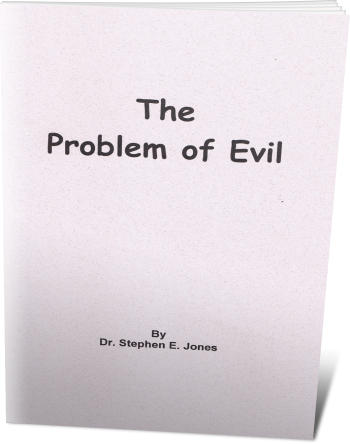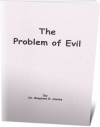Latest Posts
View the latest posts in an easy-to-read list format, with filtering options.

Why does God allow evil to occur on earth? Is God an innocent bystander? This explores the difference between the will and plan of God and between God’s sovereignty and man’s authority.
Category - General

There are two very different views about the concept of duality. One view says that a dualistic mindset means recognizing the existence of two worlds: the material world and the spiritual world. According to that view, all that we see with our physical eyes, all evil, all pain and suffering, and all death is merely an illusion.
By this, they mean that the material world does not really exist, except in our minds. They say that we create our own reality by the power of the mind, and if we could simply achieve a singular mindset by eradicating all recognition of what they call illusion, then we could come into the Kingdom of God and become immortal without dying.
Of course, most of the people who have taught this in the past are long dead. And yet many continue trying to attain such a “singular” state of mind, thinking that where others failed, they will succeed. Such people are in bondage to their own self-effort and mental discipline.
Such a view is radically different from mine. To me, God is the ultimate Reality, and all that He has created is a derivative of that Reality. Though forms change, they are very real. Though all form is mortal, it is very real, for it is part of God's creation. It does not honor God to call his creation a mere illusion.
God does not create illusion, nor does the mind of man create reality. Reality already exists independently of our recognition or assent. When man's mind attempts to create its own reality or deny the existence of what already is, it is just another attempt by the carnal mind to control the situation by the power of thought.
The natural (carnal) mind exists, along with everything else God created. But it was created to be a servant to the spirit, not its master. When a man thinks that he may create his own reality by the power of his own mind, he is a prime example of one whose mind rules his spirit. His carnal mind looks at what God has created, sees matter, evil, and pain, and then disagrees with God. He then sets out to throw off the yoke of the spirit with an inner coup, and sets about to create the illusion of a new reality in its own image.
The result is not the creation of truth, but of illusion. In the name of singularity, such people deny the existence of what God has created and enthrone their own illusion of reality.
The material world is not an illusion. God created it and called it “very good” (Gen. 1:31). God does not create illusion. Man creates illusions by disagreeing with God. Creation is not an illusion; but man's perception of God's creation can certainly be an illusion.
Illusions have to do with perception, not reality. Our goal is not to enthrone denial, but to see the world with innocent perception as a little child. Our goal is to see God's creation as it is and to accept it without alteration. Anything short of this puts men on the path toward mental illness.
I have read many authors who deny the existence of the material world. In 2006, while taking the ferry from Washington to Victoria, B.C., my wife read a book advocating such a view. In our study of truth, we are not afraid to read alternate views, because our minds are better able to grasp truth by seeing its opposite. Thus, it is good to compare viewpoints.
However, we try not to be ruled by our natural minds. That means we subordinate the mind's dualistic comparisons of truth and illusion to the power of the spiritual, singular mind. We do not deny the existence of evil, nor of illusion itself. We recognize the reality of illusion as expressed in this book. But we see it as just another temporary evil that will ultimately work out for good. That deluded author is experiencing illusion so that he will appreciate the truth that will later be revealed.
Yet at the same time, we recognize that not all are so blinded to truth. In Romans 11:7 Paul contrasted the remnant of grace (the elect) with “the rest” who were blinded. I have no mandate or calling to open the eyes of the blind. That is the job of the Holy Spirit. I cannot create such a reality by the power of my own mind, and my spirit will not do so except as a conduit for the Holy Spirit.
I can only set forth truth as I perceive it, knowing that I am still learning and growing along with everyone else. Those who are of like mind will resonate to whatever truth I can present—and forgive where I fall short. Deep calls unto deep. The Spirit of God recognizes the Spirit of God in others.
In the book that my wife recently read, the author finally admitted his belief that Jesus Christ did not really need to die for sin. After all, in his view, there is no sin, no evil, no matter, no pain, and no suffering. Because sin itself is just an illusion, there was no point in Jesus dying for an illusion. Since there is no pain or suffering, he says, how could Jesus experience any pain or suffering? And if the wages of sin is death, then the wages of the illusion of sin is the illusion of death.
Thus, it is clear that this viewpoint not only destroys reality, but it forces us to deny the Cross and the very purpose of Christ's coming. I have claimed for years that this is what such men are teaching, but I never had an actual quotable example of this. Everyone else leads the reader only to the brink of that conclusion without actually saying so, lest the alarm bells go off in the minds of their audience.
It is imperative that we understand this aspect of the Gospel of Christ. It is imperative that we know the difference between illusion and reality and how to deal with it, lest we end up denying the Cross in the name of Jesus.
Our natural minds are dualistic by nature. The mind understands all things by their contrast. The mind understands black by its contrast—white. It understands what is long by its contrast—short. It understands good according to its perception of evil. The natural mind’s inability to see with a singular “eye” (Luke 11:34) is only a problem when it refuses to submit to the leading of the spirit. When it does, however, then the truth can be known that from God proceed both good and evil, and that even the “evil” things God does actually serve a good purpose in the end.
We were created as “living souls” with a finite mind that was meant to serve our spiritual mind in which dwells the Holy Spirit of God. This soulish realm, along with everything else in creation, is real, for God did not create it as an illusion to be denied. The soulish mind naturally thinks in a dualistic manner, for this is the extent of its capability, but this is not “bad” or “evil” in itself. It only becomes evil when it stages a coup against the spiritual mind and then sets out to create a “better” reality in its own image. That so-called “reality” is the real illusion.
In Isaiah 45:7 we read that God creates evil. Men's soulish minds disagree with this for various reasons, primarily because they do not understand such a reality. If they cannot handle such a reality and cannot find the biblical answer to it, they often go into denial. The mind revolts, refuses to remain in its servant role, and then sets out to correct the situation. But because the mind itself is finite, it can only create illusions when it functions independently of the spirit.
The author mentioned earlier claims that he is called to be a creator, and that he can create reality by the power of thought. He further says that we cannot expect God to do it, because we ourselves have been called to do it. There is a grain of truth in what he says, because we have indeed been called to participate in the creation of the new heavens and the new earth. But we must do so only by the power of the Amen (Rev. 3:14).
An "Amen" person is a responder, not an initiator. He is a double witness of what the Spirit does, not a creator that expects God to bear witness of him. Apart from Him, we can do nothing (John 5:30; 15:5). As long as He is the Head directing the body, we have authority. But when we make ourselves the head, we can only scream at the universe and create more illusions of how we think things ought to be.
In other words they think to themselves, “If I were God, I would have done it this way—” thereby improving upon God's creation by eradicating all matter, human flesh, evil, pain, and suffering. Perhaps such people should read the book of Job again.